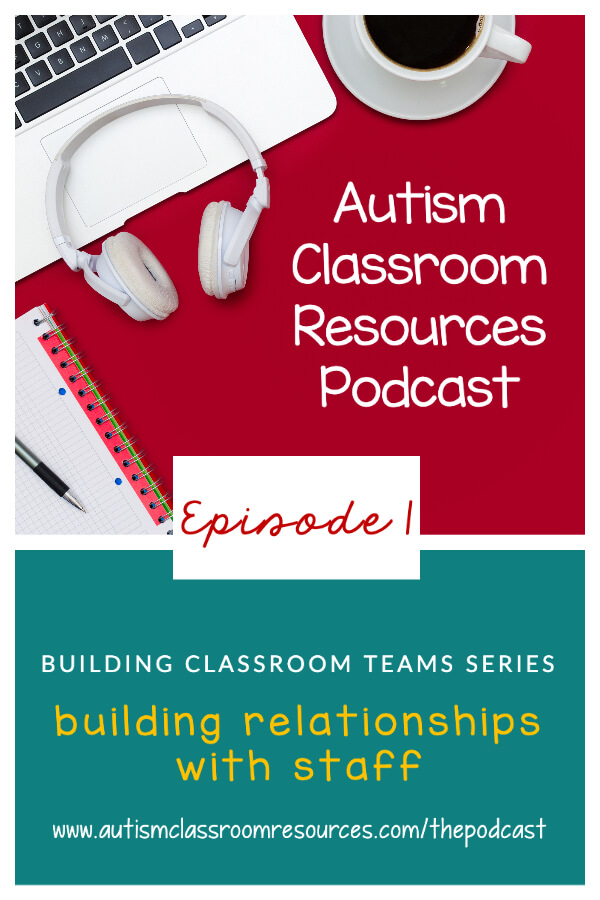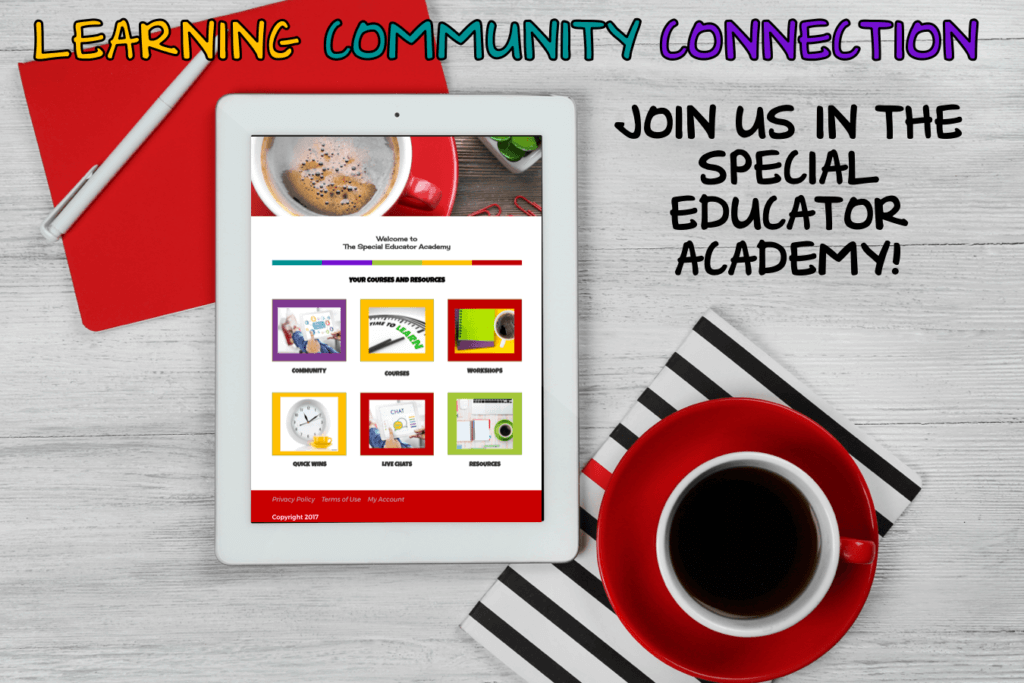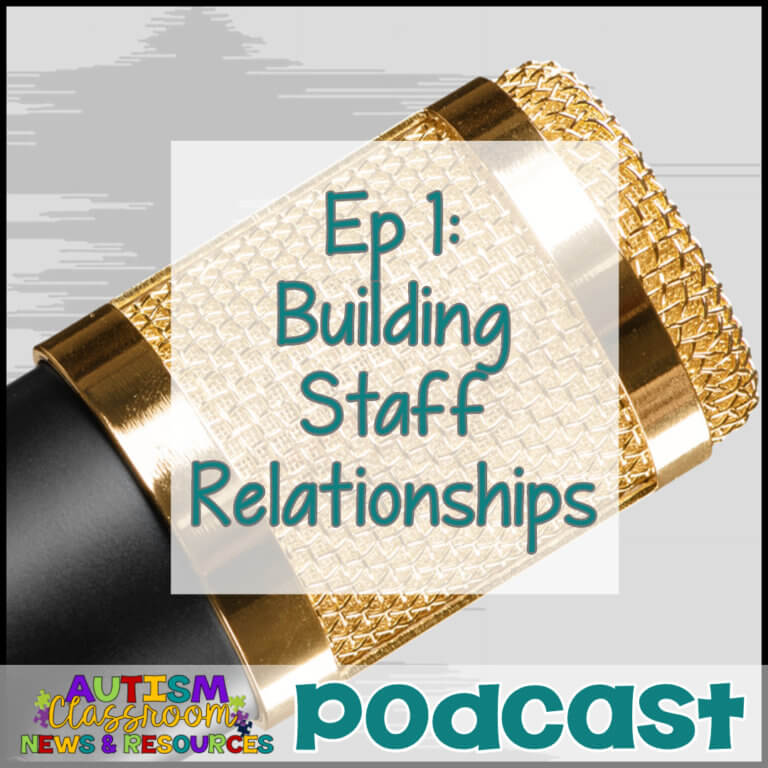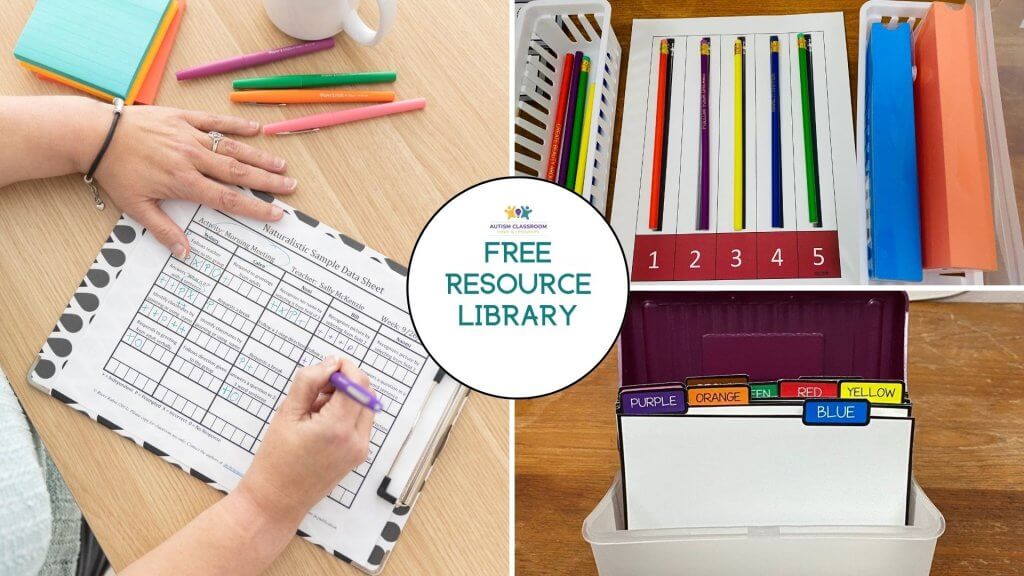Welcome to the Autism Classroom Resources Podcast, the podcast for special educators who are looking for personal and professional development. I’m your host, Dr. Christine Reeve for more than 20 years. I’ve worn lots of hats in special education, but my real love is helping special educators like you. This podcast will give you tips and ways to implement research-based practices in a practical way in your classroom to make your job easier and more effective.
I am excited that you are joining us today as we are going to kick off a five episode series of building teams. Now, I know that one of the biggest issues that I see in here, most teachers struggling with other than data, which we’ll talk about in the future is working with adults. And whether you’re a special education teacher who supervising paraprofessionals in your classroom or a speech pathologist working with a variety of teachers or a teacher who’s just collaborating with other people on your grade level. Working with adults often seems harder than working with the students. And one of the things that I also know is that working with adults in a classroom is a very different experience than supervising adults. In other situations. If I supervise behavior analysts, they can go back to their office or wherever and kind of digest what I’ve said.
If I am providing feedback to a para as a teacher, I am staying in that room with them for the next six hours. If we are in a self-contained room or I’m working around them in some way or another. Same thing between special ed and general ed teachers and SLPs and paras or teachers. So all special educators are dealing with this. In some way. This episode is going to focus on how we can create effective classroom teams and how we can make things better and less stressful and our classes while also providing the training support and collaboration that we need to use.
So as I said, most of my career has been spent as either support staff, administrator or consultant and that means that it was always my job to work with adults more than the students. And so I know that sometimes it’s hard because our expectations for adults of course are higher than for our students. But we are also in a really difficult position in a school. It’s not the same type of management that you read about for a company. It is particularly challenging to work, for instance, with paraprofessionals, not because they’re paraprofessionals, but because you and the paraprofessionals are in a classroom for six to seven hours a day and you depend on each other to get through the day. You can’t give them feedback and let them go, kind of digest it later. It happens right now. And the best type of training that we can provide for staff is to model, demonstrate, and give feedback.
Because without feedback, no one learns. So I want to help you by sharing some things I’ve learned over the years. You have to be a lot of things. Obviously as a special educator, you have to have where a lot of different hats and one of those things is being a teacher leader. So consider this a leadership seminar of sorts. And being a teacher leader is different than being a corporate leader. So let’s start, I’m going to have five tips for five episodes. So let’s start with number one, get to know each other. And I realized that that sounds ridiculous. Like try, trust me, I do every time I say it out loud, I think, Oh my gosh, but it really isn’t. And I also know that it’s really hard these days to get to know staff and for the staff to get to know you because you don’t have a lot of time together where you don’t have students.
Some of you don’t have any time together when you don’t have students, but getting to know them is really a big piece of it. You know, you see all this stuff on social media about build relationships with your students and that is critical. We know that that’s critical. And when I talk about behavior in the future, I’ll talk about that some more. But it’s equally important to build relationships among the adults. How can you expect people to be part of a team if you have no relationship with them? In order to have a successful partnership, you have to have that relationship. But relationships don’t happen overnight. Now I’m not saying that you have to be besties or sisters or brothers in your past lives, whatever you may have had the opportunity in your career. If you’ve been doing this awhile of having someone in your classroom who is the other half of your brain, who is your right hand and if they disappeared you would be lost because they are the people who can anticipate what you need.
You’ve worked together and you’ve worked together well long enough for that to happen. But we’ve also worked either as a paraprofessional or as a teacher with people who had less experience than we did or people who in Paris situations have no background and training in what we’re asking them to do. That is left up to us. So you do, but you do have to have respect for each other and you can only respect people if you build a relationship with them. And relationships have to start with getting to know each other. So take some time at the beginning of the year or whenever you’re listening to this to have a real conversation with the staff in your classroom about more than just what the duties are, what needs to be done, what you need from them. And here’s some things you might want to include. You obviously want to know about their personal lives because that’s just good social skills and that’s what we teach our students to do.
Are they married? Do they have kids? And since we teach social skills, we need to do that. But there are also more specific questions that you can ask in relation to a job type, the job type. Find out why they got into this. Okay. Obviously knowing their history and experience is going to be helpful, but get to the why they want to do this. What is their motivation? Because that’s what’s going to make a difference in them becoming a critical piece of your classroom. Ask the person what he or she sees as the most critical component of learning for your students. Do they have a personal connection to working in special education? Do they have a child or a sibling with disabilities that brought them here? This is a very tough job, particularly if you are in a self-contained class or you’re dealing with students with behavioral issues.
It is not an easy job to be a para in this situation. It’s not an easy job to be any professional in this situation, but there are thousands of things that they could do. They’re also not paid well enough to really overcome that. So it’s not like it’s a glamorous high paying job that they’ve sought for themselves. So why are they there? Do they have that personal connection? What do they see as their biggest strength when coming into the classroom and what are they most interested in doing with the students? You may find that you have somebody who loves to sing and play a guitar and would love to run morning meeting and have more music in your classroom. You may find that you have somebody who loves to garden and that’s an awesome activity for a lot of our students, younger students.
And our self-contained older students to learn and that allows you to know how they see themselves, but also gives you some ideas about how your strengths and weaknesses match up with theirs. Now, clearly you’re not going to pepper them with questions. You’re not going to conduct an interview unless you’re lucky enough to be in on the hiring, in which case you are so lucky. You’re not going to give them a questionnaire, but as you begin to talk to them, these are the things that you might want to know that you might ask as they might help to move your relationship forward. Now, I recognize that most of you don’t have the time to have these conversations with your paras. So here are some ideas for how to make it happen. One is considered before school starts. If it hasn’t started for you yet, asking them if you could go for a walk with them or take them for a cup of coffee or something like that.
Find out what they like to do, then join them on that. Ask them if you could talk to them and get to know them. If they are there to help set up your classroom, that’s a perfect time to have a conversation because we all know it’s much easier to have a conversation while you’re doing a shared activity then at a cocktail party, unless you’re much more extroverted than I am. So find those times. If you can’t do that, if you can’t do something outside of hours, see if there’s a time that maybe you run a one man down plan where you have, you run the classroom as if a staff member is absent and spend some time just talking with them while you’re working with the kids. You’re not going to spend a lot of time talking about things other than the students when you’re working with students.
But it is a way to share time with them and get to know them. If you have the opportunity to ask your principal, could they stay an extra half hour or could they, you know, stay a half day on a professional development day, would we be able to pay them for that? Seek that out and advocate for yourself because being able to coordinate with your staff is really critical to be able to do the job well and I’ll have some other suggestions for how to do that. You really want to find a way that you can be with that person, that you can talk with that person more casually to take the barrier of supervisor versus para down a bit and really talk and really listen to them and listening is really the most important part. Ask them about themselves and listen to what they say. It may be that this conversation happens best after they’ve been with you for a little while, so not at the beginning of the year so that they become more comfortable with you because the more comfortable that you get, the more that you find out about someone, the more that it’s going to be less stressful to be around them and to spend the day with them.
So you really want to think about how you can create those opportunities to find out a little bit. It might be two minutes before the buses leave that you have that conversation. It might be, you know, two minutes as they’re putting on their coat to go out the door at the end of the day. Another option is to trade off with other teachers in your school. So if you’re a para has bus duty and her para has bus duty, could they trade off one day so that the teacher’s doing your paras bus duty. See you can talk to your para and another day you do her paras bus duty so she can talk with her para. Same kind of thing could be done with covering classes. You could run a one man down zoning plan and I’ll put a link to explain what that means and we’ll talk about it later in the series.
And then maybe you can send a para to her room so she can have a meeting and then she can a para to your room so you can have a meeting. So it doesn’t have to be a formal meeting, but it could be an opportunity just to talk about a specific activity and how things are going. And that gives you a chance to actually chat, which is time that we don’t have a lot of these days. So we do have to get very creative in how to do, do that, find those times to have those conversations, share about yourself, but listen about them and find out what motivates them because that’s going to play a large role in being able to help them help you and all of you help this student. And one of the things that you’re going to hear frequently from me in this podcast will be that we always keep the student at the center of what we do.
So knowing what their connection is to this student is going to be a huge piece of building that relationship and getting started on the right foot or mending a relationship and continuing on the right foot. Is that, will this tip solve all your problems with working staff with staff? No, it won’t. And not everything will work in all situations. Not all staff were meant to work together. Not everybody was meant to trust each other, but it will help you to interact in a less stressful environment. When you have a relationship with the people that you work with, when you know about them, when you know what their issues are, as you get to know them, it will help, but letting them know that you care about them will also help.
I would love to hear your ideas and strategies for getting to know your staff, so hop on over to a private Facebook group. Answer the questions. If you haven’t already, you can go to special educators, connection.com and I’ll put that link in the show notes and I will be back in our next episode with tip number two. Thank you so much for listening today. I truly appreciate you taking the time. I hope that you will go and subscribe so you’ll get future episodes and I hope to see you on Facebook. Thank you.
